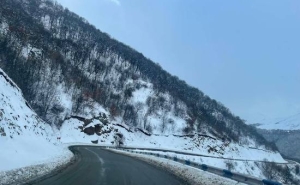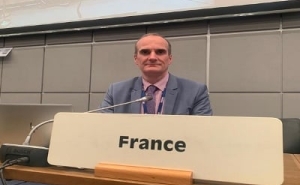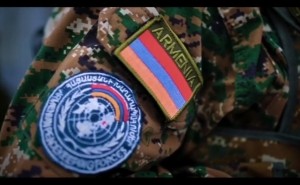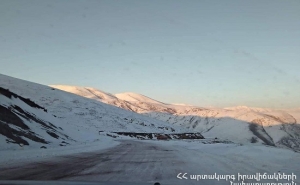International Law Expert: After the ECHR Decision the European Countries will not Seek to Criminalize the Denial of the Armenian Genocide

On October 15 the European Court of Human Rights (ECHR) in Strasbourg issued a verdict in the case "Perincek against Switzerland." The court ruled that the Swiss government "violated the right to freedom of expression," of the leader of the Turkish Workers' Party Dogu Perincek. In an exclusive interview with "Armedia" IAA international law expert Levon Gevorgyan explains the consequences of this verdict.
- How would you access the ECHR decision on the case "Perincek against Switzerland" for each of the party?
- In fact, for Switzerland th court's decision means that it will be limited in applying the law criminalizing the denial of the Armenian Genocide. This means that Switzerland will either have to change the text of the Criminal Code in the context of the Armenian Genocide and to limit it only with the genocides recognized by international organizations, or it would have to use this provision in a very limited way and in any case not to use it in the context of the Armenian Genocide. In this sense, of course, it is a defeat for Switzerland.
For Perincek - as the claimant – this is a complete victory as he got what he wanted. From now on his application would be considered in the light of the 10th article of the European Convention on Human Rights, which is considered an indicator of human rights.
If you try to consider the dividends of the Republic of Armenia in the Perincek case and say whether it is a victory or defeat, it should be noted that Armenia was a third party and, of course, a third party cannot win or lose. One can only talk about whether the interests of Armenia were taken into account or not? In some sense, it was a "defeat" for Armenia because we understand that it is important for Armenia that the Genocide was not considered differently from the Holocaust and other genocides. The decision of the court, in fact, makes this differentiation - in contrast to the Holocaust, the denial of the Armenian Genocide may be described as a manifestation of freedom of speech.
- There are two conflicting approaches towards this case. According to the first, the court’s decision coincides with the interests of Armenia. According to the second one, it is a defeat for Armenia and a step backwards in the process of recognition of the Armenian Genocide. Which of the approaches are you personally for and why?
- The state authorities of Armenia say that it was a victory. According to them, the verdict should be considered as a victory, since all claims put forward by Armenia were fulfilled. But we understand that the requirements may not coincide with the real interests. From this perspective, it is difficult to agree with the opinion that the decision of the ECHR can be considered positive for the Republic of Armenia.
In particular, we say that in the context of the Armenian Genocide we are promoting only the recognition process, without trying to solve the problem with judicial means and the most effective way of the recognition process is the criminalization of denial when countries recognize the genocide and then also criminalize its denial in their territories.
In this regard, the ECHR decision is a clear step backwards for us, since the European Court of Human Rights no longer considers the criminalization of Armenian Genocide denial a matter of interference at least in European countries. From this perspective, the decision clearly contradicts to our interests.
- Can this verdict become a hindering factor in the adoption of bills criminalizing Armenian Genocide denial in other countries?
- Surely, as the European Court put certain criteria on the issue of differentiating it from the Holocaust. The first criterion is chronological: it is said that in contrast to the Holocaust, a long time has passed since the Armenian Genocide. The second is geographical: it is said that the European countries had no direct geographic and historical involvement in the Armenian Genocide. Thus, in contrast to the Holocaust, the need to criminalize the denial of the Armenian Genocide as such does not exist for the ECHR. And, of course, the European countries will not seek to criminalize the denial of the Armenian Genocide.
Another question is that if the denial is accompanied by racial discrimination, containing calls for violence against the Armenians, then such statements will be legally pursued.
-
 17:08
17:08The regular session of the Anti-corruption Policy Council takes place in Jermuk
-
 15:05
15:05The Prime Minister sends congratulatory messages to the supreme leader of Iran and the President of Iran
-
 11:11
11:11Armenia sends earthquake aid to Turkey
-
 10:43
10:43Commemoration of the Pontiff St. Sahak Partev
-
 09:16
09:16Some roads are closed and difficult to pass in Armenia
-
 19:55
19:55Phone conversation of the Foreign Minister of Armenia with the U.S. Assistant Secretary of State for European and Eurasian Affairs
-
 18:30
18:30Prime Minister Pashinyan and President Khachaturyan meet
-
 18:20
18:20Ararat Mirzoyan with Co-Chairman of the OSCE Minsk Group of France Brice Roquefeuil
-
 17:01
17:01Humans could land on Mars within 10 years, Musk predicts
-
 16:45
16:45France, US urge 'immediate' end to Nagorno Karabakh blockade
-
 16:01
16:01Blockaded Nagorno Karabakh launches fundraiser to support quake-hit Syria
-
 15:59
15:59Earthquake death toll in Turkey rises to 18,342
-
 15:43
15:43Ararat Mirzoyan Held a Telephone Conversation with Sergey Lavrov
-
 15:06
15:06French president rules out fighter jet supplies to Ukraine in near future
-
 14:47
14:475 Day Weather Forecast in Armenia
-
 14:44
14:44President Vahagn Khachaturyan wrote a note in the book of condolences opened in the Embassy of Syria in Armenia
-
 14:20
14:20Azerbaijan’s provocations impede establishment of peace and stability – Armenian FM tells Russian Co-Chair of OSCE MG
-
 12:57
12:57France representation to OSCE: Paris calls on Azerbaijan to restore freedom of movement through Lachin corridor
-
 11:40
11:40Command of Kosovo forces highly appreciated preparation of Armenian peacekeepers
-
 10:16
10:16The United States withdrew from sanctions against Syria for six months the provision of assistance after the earthquake
day
week
month
Humidity: 67%
Wind: 1.03 km/h









